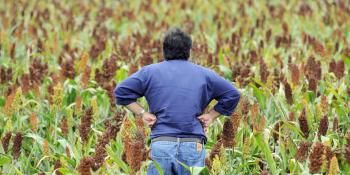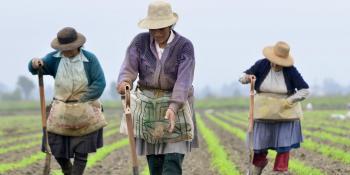Food and farming under climate change: moving towards a global agreement
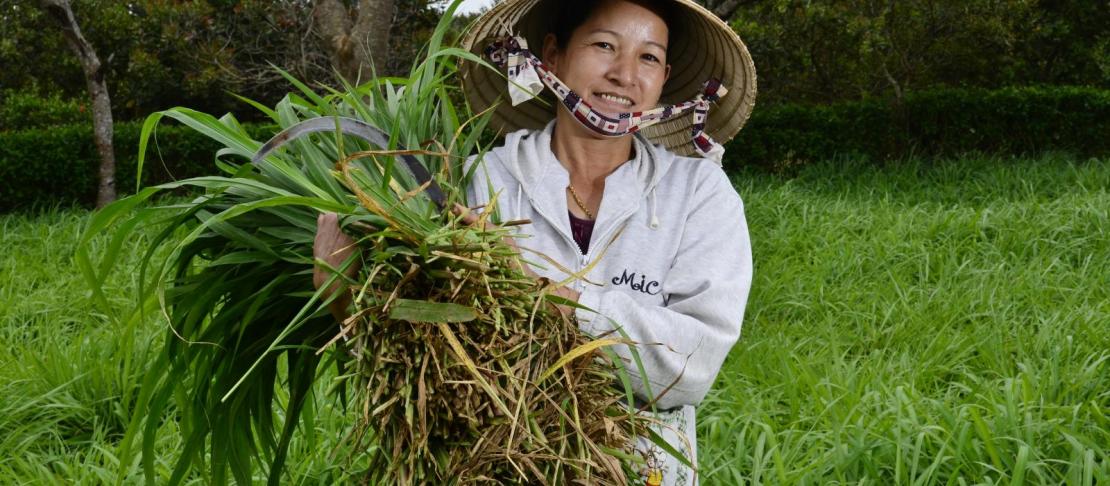
High-level discussion highlights pathways for achieving food security under climate change and reducing global emissions from agriculture.
Read: The Mitigation Advantage Report (July 2015).
Can a global climate change agreement meaningfully respond to the needs of smallholder farmers, who are already feeling the impacts of climate change? And can smallholder farmers join the global fight against climate change without compromising food security?
These questions brought together groups at the nexus of agricultural and climate change issues including the French Ministry of Agriculture, Agrifood and Forestry; the European Commission; the International Fund for Agricultural Development (IFAD), CARE International, and leading scientists from the IPCC and CGIAR.
The event on Food and Farming under Climate Change: Moving toward a global agreement took place on 8 July 2015 alongside the global science conference Our Common Future Under Climate Change in Paris. The events aimed to catalyse action in the lead-up to the UN Climate Conference (COP21) in December.
Agriculture is the basis for the development of modern civilisation. The cultivation of land and domestication of animals triggered revolutionary social change that shaped a new course for humankind. So why has agriculture been so overlooked in the context of climate change, particularly when half a billion people today depend directly on food and farming for survival?
Agriculture – the basis of modern civilisation – has been mostly overlooked in the context of climate change
We now know that climate change is already affecting crops, fisheries and livestock around the world, as declared by the latest report from the Intergovernmental Panel on Climate Change (IPCC).
At the side event, Jean Jouzel, the Nobel-award winning French climatologist and IPCC vice-chair, highlighted current impacts on staple crops like rice and wheat, as well as fisheries. Jouzel pointed out that climate change will create ‘many losers’ among regions that are currently highly dependent on agriculture, yet highly vulnerable to shocks and changes. Our mission is clear, according to Jouzel: “We need to do everything in our power to guarantee food security,” he said, “but the bottom line is simple – we must absolutely fight against climate change and mitigate it as much as possible.”
It turns out that many actions which enhance food security and improve climate resilience for smallholders, also reduce emissions. This is according to Michel Mordasini, Vice President of IFAD, who shared a new study which found that thirteen IFAD-supported adaptation projects could reduce CO2 emissions by about 30 million tonnes by 2034. The study, which was undertaken by IFAD, the CGIAR Research Program on Climate Change, Agriculture and Food Security (CCAFS) and the UN Food and Agriculture Organization (FAO), showed that improved agronomic practices, afforestation and rehabilitation of degraded lands help address farmers’ immediate needs for increasing yields and incomes, even with more unpredictable weather, while also reducing emissions and storing more carbon in the landscape. In addition to these benefits, this opens new opportunities to access climate finance to support food security actions, as over 90 percent of public and private climate funds currently going to mitigation, not adaptation.
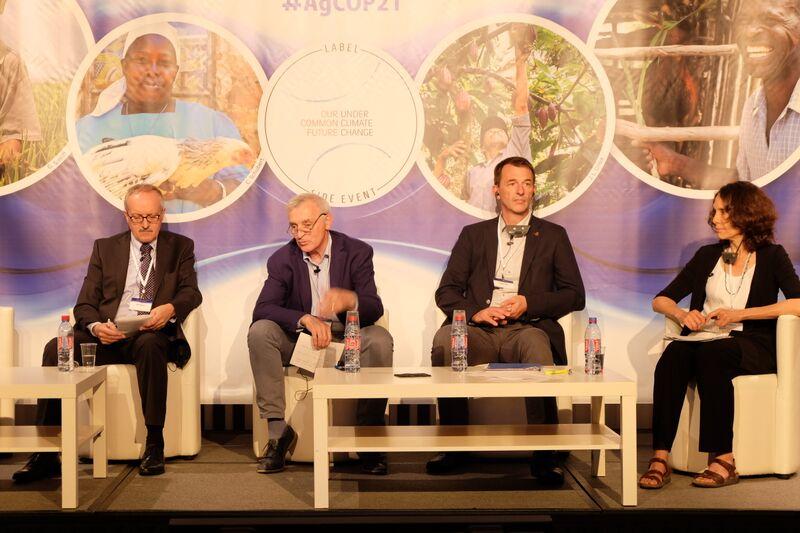
Panel Discussion. Photo: C. Neglia (IFAD)
During the event, panelists and audience members shared examples of country-led initiatives, where governments are working with farmers, the private sector and civil society to improve resilience and reduce emissions where possible. Lini Wollenberg, who leads CCAFS research on Low-Emissions Agricultural Development highlighted how the government of Vietnam is investing in an approach to paddy rice production called Alternate Wetting and Drying, which uses less water (a blessing in times of drought) and reduces harmful methane emissions (currently the chief source of emissions in Vietnam).
In Kenya, Wollenberg highlighted how the dairy industry is interested in boosting milk production and improving supply reliability through better feed and ‘zero grazing’. The upshot is reduced emissions from livestock, which has inspired the Kenyan government to pursue funding for mitigation actions.
Meanwhile, in Mexico, the government is working with the International Maize and Wheat Improvement Center (CIMMYT) to test the ‘greenseeker’, a new tool that uses optical sensors to measure the nutrient status of maize plants based on their colour, allowing farmers to carefully target nitrogen-based fertilizers to improve maize yields. The result is more efficient use that saves farmers money, and also reduces nitrous oxide emissions.
But these technologies are not “silver-bullets,” explained Wollenberg. Interventions need to be suited to farmers in different contexts and put food security first.
Beyond national actions, world leaders need to build momentum that gives way to ambitious commitments in the final months before COP21. To this end, the French government shared its vision of fighting climate change while guaranteeing food security in a new initiative focused on increasing the amount of organic matter in soils, which would simultaneously make land more fertile, increase crop yields, and also act as a vital sink for storing carbon.
Stéphane Le Foll, France’s Minister of Agriculture, Agrifood and Forestry, highlighted the “4 for 1000” initiative, which aims to increase the amount of organic matter in soil by 4 per thousand (0.4%) each year, which would be enough to compensate for all global greenhouse gases emitted due to human behavior.
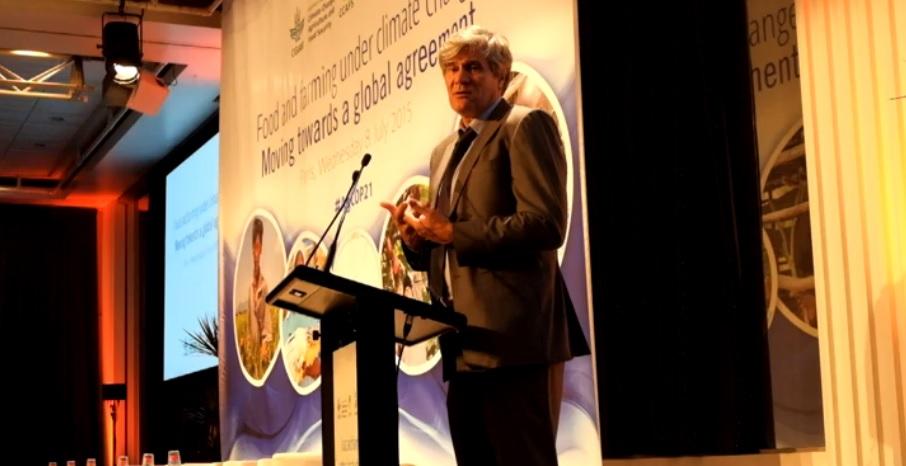
Stéphane Le Foll, the French Minister of Agriculture. Photo: C. Neglia (IFAD)
“We need to make sure that countries don’t see a climate change agreement as a hindrance, but rather as an opportunity to guarantee their own development,” said Le Foll. Achieving this requires research on assessing the potential for soil carbon sequestration globally and developing locally appropriate technologies, so science partnerships will be essential. This initiative will be championed by France in the lead up to COP21, in collaboration with research groups such as CGIAR, INRA, CIRAD and IRD, and is likely to appear on the on the Solutions Agenda at the climate conference.
The European Commission is also stepping up to the challenge of tackling adaptation and mitigation in agriculture. “We need to explore all possible options” to address issues related to malnutrition, sustainable food production, rural poverty and adapting agriculture to climate change, said Fernando Frutuoso de Melo, Director General of the European Commission’s International Cooperation and Development.
De Melo highlighted that the EU has committed at least 20% of its total budget to actions dealing with climate change, with a pledge to include all sectors in the climate change fight, and lead on integrating agriculture into climate change activities. This translates into around EUR 41 billion of EU cooperation and external aid to climate-relevant actions from 2014-2020. In the last five years alone, EUR 80 million were allocated to agricultural research for development each year, with a significant contribution to CGIAR in close collaboration with IFAD. But beyond developing knowledge, innovations, and expertise, the EU is ready to put farmers at the centre of efforts against climate change in order to make a meaningful impact, said De Melo. “The farmer should not be seen as a recipient, but play a decisive role throughout the process.”
To date, many mitigation solutions in agriculture propose large-scale actions led by national governments and multi-national companies. But according to several participants at the event, putting farmers and their organisations at the centre, as co-leaders in developing solutions, will likely lead to more sustainable benefits for food security and agricultural mitigation.
Indeed, putting people’s own agency and decisions front and centre, emerged as one of the most important themes during the discussion. This includes addressing the inequalities that shape how different social groups experience climate change. Wolfgang Jamann, Secretary General and CEO of CARE International, said closing gender gaps would be a critical task. “We need to overcome political issues to address food insecurity and undernutrition,” said Jamann. Furthermore, COP21 must focus on “the impact climate change is already having on vulnerable populations, rather than as a distant future challenge,” he stressed. “Community-based approaches are essential for implementing climate-smart agriculture,” added Mordasini.
A recurring concern is whether a focus on mitigation in smallholder farming will undermine food security. “How real are we in our discussions when we compare what’s happening in a farmer’s field?” asked Ambassador Yaya Olaniran, Permanent Representative of the Federal Republic of Nigeria to the UN Rome-based Agencies “Smallholder farmers don’t care about carbon or carbon markets,” added Tony Simons, Director General of the World Agroforestry Center. Farmers will always prioritise benefits to their livelihoods and themselves, so it’s important that new initiatives and agricultural interventions continue to focus on soil fertility, nutrition, crop diversity and productivity. It’s important to build on existing knowledge and practices, that could be improved to deliver both adaptation and mitigation, said Wollenberg. To be successful, policies and research must “harness farmers’ innovation capabilities and networks, and improve their access to credit,” she explained.
So is there a common agreement on the way forward for food and farming under climate change? The event showed that the conversation is ongoing, with many perspectives and often divergent views, particularly between more developed and least developed countries. New and ongoing initiatives show great promise. We need a better collective understanding of the challenges ahead – much work remains to be done to reach consensus at COP21 and beyond.
Learn more
Read: The Mitigation Advantage Report (July 2015).

